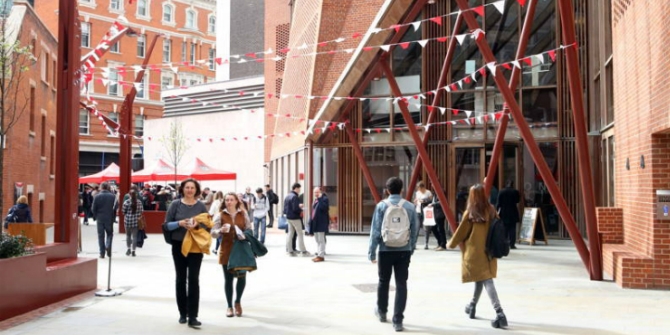Inspired by the LSE Library’s latest exhibition on Beveridge and the welfare state, student Lucy Smith organised a visit to the LSE for her A-Level teacher and his pupils from Drapers’ Academy, Romford. Her post underlines the importance of praxis and reminds “all of us who say ‘sociology’ to actually do sociology”.
Firstly, I’d like to thank Tom Brookes for a fascinating blog post which inspired me to organise this important event (and, in turn, write this post of my own). In the blog piece, Tom discusses how they often finds himself “saying sociology but doing privilege”. This is indeed true of everyday life as a student of sociology at the LSE. As a working class woman, I’ve found myself in a precarious position – that is, the position of someone who is deemed to be “socially mobile”. As I approach the end of my undergraduate degree with tremendous aspiration for my future, the feeling of accomplishment is nevertheless overshadowed by financial uncertainty. Such is the nature of so-called “golden tickets” for ‘gifted’ working class students. We might have the ability and the tenaciousness, but the financial odds are always stacked against us. Comradery is a privilege of the wealthy; those of us with “golden tickets” must compete with one another for the limited number of scholarships available.
As such, I decided to utilise the privilege I do have and invite my A-level teacher and his pupils to the LSE for the Beveridge Exhibition. When I took the time to wander about the exhibition one dreary afternoon, memories of my own past came back to me. I was instantaneously reminded of my teacher and his classes, where I’d first learned of the Beveridge Report. The inspiration struck me and I acted quickly to inform him of the exhibition, and to also invite him (and his students) to attend campus. Eventually, with the help of Emma Glassey and the Widening Participation team, we managed to arrange a school trip to LSE. Since my teacher and his students had seen the department’s promotional videos (featuring LSE academics), it followed that arranging a casual Q&A with members of faculty and undergraduates would give the student’s an actual opportunity to ask the sociological questions they had been developing as part of their studies.
It may sound biased, but I believe that the event was a great success because it enabled all of us who say “sociology” to actually do sociology. As sociologists, we should appreciate that class remains the nexus of power within British society. Indeed, to quote Dr Lisa McKenzie: “The class system is static. Social mobility is a lie. Mobility means movement – and there is none”. When working class students become “mobile”, it is often through cherry-picking practices (i.e. BBC, ‘Generation Gifted’). We are always, inevitably and regrettably, outnumbered. And whilst many parts of my LSE experience have been troubling and problematic, I still find invaluable inspiration in the subject I love – sociology. Sociology gives me purpose. It is the thing that drives my pursuit of knowledge despite my continuous embroilment in a seemingly infinite battle against the British class system. Approaching the finish line, I’ve finally come to acknowledge my struggle with class and embrace it. I am “Lucy from Essex” and you might find my accent garish, or believe that I wear “too much” make up, or that I’m not a natural blonde. But I find inspiration here, in small prejudices enmeshed within everyday life; not only epistemologically (i.e bringing something “new” to the table), but because sociology needs “the likes of us” politically. As Pierre Bourdieu (2001) claimed, “La sociologie est un sport de combat” (“sociology is a martial art”). It is crucial to do sociology rather than merely say it. Sociology is a powerful tool for understanding, but most importantly for challenging, society. Perhaps the first step towards doing this is to chatter less about the finer points of “discourse”, and focus more of our energy into developing a praxis.
 Image credit: (Mary Crandall CC BY-NC-ND 2.0)
Image credit: (Mary Crandall CC BY-NC-ND 2.0)
Later this week, Researching Sociology will publish Part II of this post, curated by my teacher and his students about their experience of visiting the department. They raised some insightful and rigorous questions about social mobility and the education system. These are the questions and the thoughts of young, working class sociologists who have something invaluable to say about meritocracy. I therefore urge you to read it. And once again, thank you to everyone who participated in the event. You have made the following original contribution possible. Inclusionary practice is a crucial tool for challenging the epistemic injustice at the heart of the subject we love. Whilst the visit was initially organised around the Beveridge artefacts, I believe that what was gained from the experience superseded the mere viewing of a few historical relics. Such is the importance of praxis – “sociology is a martial art”.
References
La sociologie est un sport de combat (2001) film produced by VF films, Montpellier, (distributed by CP productions, 9 Rue du jeu de ballon, 34 000 Montpellier).
Mckenzie, L (2016) “Lisa McKenzie: The class system is static. Social mobility is a lie. Mobility means movement – and there is none”, Twitter, 24th November 2016 [Online]. Available at https://twitter.com/oxfordunion/status/801910194213191680. (Accessed 27th February 2018).
Lucy Smith (@SmithLu_x) is a third year BSc Sociology student in the Department. Her interests include STS (Science and Technology Studies), the Sociology of Knowledge and Education, Social Theory (Contemporary and Classical), Continental Philosophy and the Philosophy of Social Science.





Lucy from Essex: You have probably finished your degree and moved on, but I am only finding this blog post now. Every once in a while I read every blog post and article that I can find that has used one of my photos. I love this ladder against a red wall; I think that it was the back of a a theatre in Plovdiv Bulgaria. But then again, I am drawn to red.
As a first year University student many years ago I did all that I could to avoid sociology. Now as an adult I find it fascinating. I thought that the comment about sociology as a martial art was thought provoking. We’d like to think that all western societies are socially mobile (or upwardly mobile) and that we’re all on equal footing when the reality is quite different.
Thanks for the read and for a few things to think about.
Take care, and I hope that you find your way to be as mobile as you can.
Mary from Toronto.